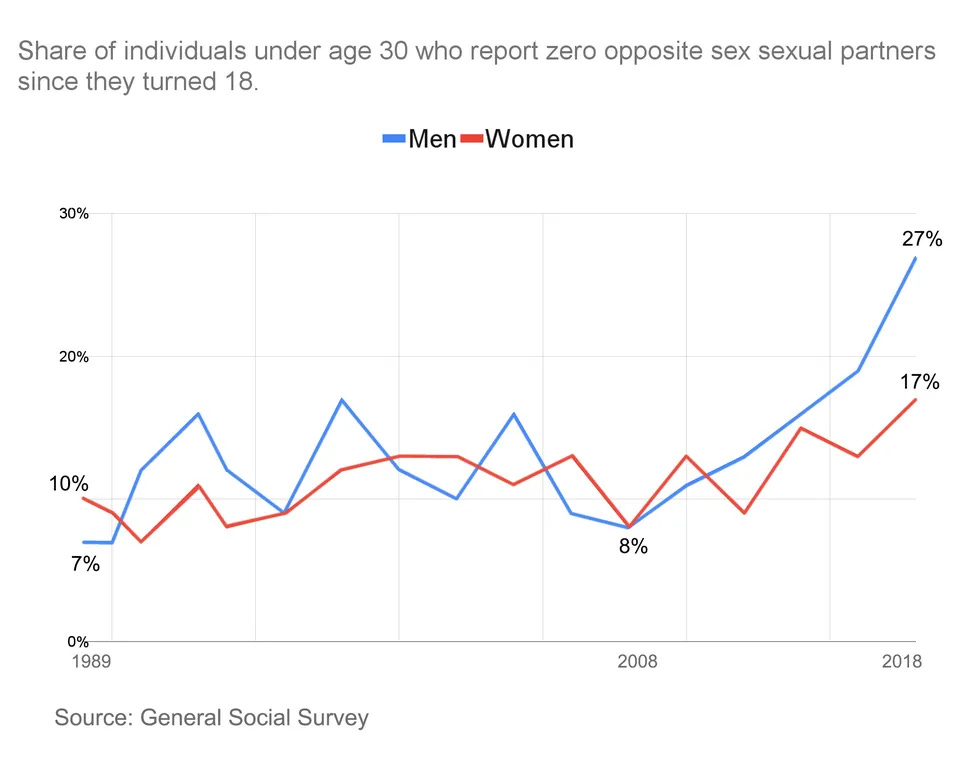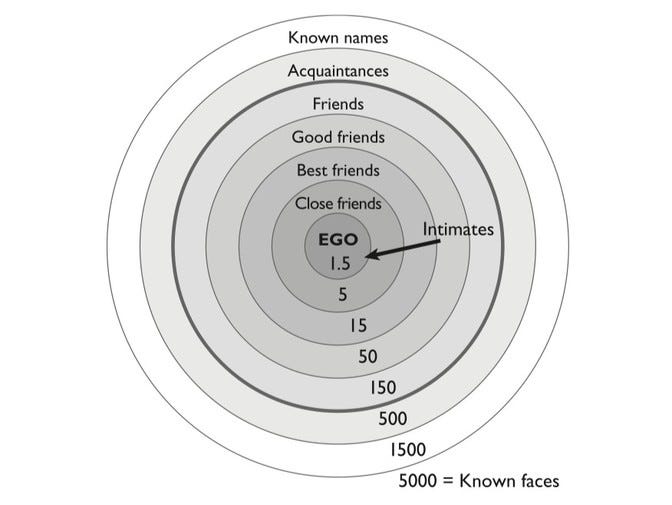The Long Game 141: Optimization & Fragility, Maintaining Close Friendships, Population Collapse, Energy & People
👥 The Social Recession, HRV & Strength Training, Represent, Assault Bikes, People Are Not Stupid, and Much More!
Hi there, it’s Mehdi Yacoubi, co-founder at Vital, and this is The Long Game Newsletter. To receive it in your inbox each week, subscribe here:
In this episode, we explore:
Optimization & fragility
You can only maintain so many close friendships
Is population collapse a real risk?
Energy & people
It's not supposed to be easy
Let’s dive in!
🥑 Health
💔 Optimization & Fragility
Over the last few months, I kept having the same thought about extreme optimization & fragility:
As more and more of us are entering the world of taking care of our health and optimizing it, I think this question will be central to the space.
On a personal level: the moment I feel the best, and the healthiest are not moments of obsession; quite the opposite. I’ve tried many diets and found that strict and restrictive diets can work for some time but tend to exacerbate the cravings for what’s excluded.
A similar idea goes for sleep schedules: being very strict about it will potentially provide you with great sleep, but you feel horrible at the slightest change of plan.
So what are we getting at here? My thoughts aren’t fully formed on this yet, but it’s clear that over-optimization comes with its share of issues, which are often not discussed and shared by the proponents of these lifestyle interventions (myself included.)
Goggins explores a similar idea in his latest book. He explains that he doesn’t care about “optimal” training because he’s training for life, and life is not always optimal.
If you have some thoughts or resources on the topic, please share them with me! I’m trying to write something long-form on this as I can’t stop thinking about it, and writing about it is the only way to actually think things through!
🌱 Wellness
🍕 You Can Only Maintain So Many Close Friendships
This is an interesting piece on friendships as an adult, a topic that’s not often discussed.
Dunbar: Dunbar’s number really isn’t a single number. It should be a series of numbers. When collecting data on personal friendships, we asked everybody to list out everybody in their friendship circles, when they last saw them, and how emotionally close they felt to them on a simple numerical scale. Relationships turned out to be highly structured in the sense that people didn’t see or contact everybody in their social network equally. The network was very clumpy.
The distribution of the data formed a series of layers, with each outer layer including everybody in the inner layer. Each layer is three times the size of the layer directly preceding it: 5; 15; 50; 150; 500; 1,500; 5,000.
The innermost layer of 1.5 is [the most intimate]; clearly that has to do with your romantic relationships. The next layer of five is your shoulders-to-cry-on friendships. They are the ones who will drop everything to support us when our world falls apart. The 15 layer includes the previous five, and your core social partners. They are our main social companions, so they provide the context for having fun times. They also provide the main circle for exchange of child care. We trust them enough to leave our children with them. The next layer up, at 50, is your big-weekend-barbecue people. And the 150 layer is your weddings and funerals group who would come to your once-in-a-lifetime event.
A simple reason explaining that is how long it takes to move someone from an acquaintance to a close friend: about 200 hours in a few months.
Han: Unsurprisingly, the amount of time spent together is a crucial factor for forming and maintaining friendships. A study by Jeffrey Hall, which you mention in your book, outlined how many hours it takes for someone to go from an acquaintance to a casual friend, then to a meaningful friend, and finally to a best friend.
Dunbar: It takes about 200 hours of investment in the space of a few months to move a stranger into being a good friend. This fits with our data, which suggests that close friends are very expensive in terms of time investment to maintain. I think the figures are a guideline rather than precise. It just means friendships require work.
Pair with: The science of happiness
The distressing thing is that friendship is a skill that requires practice
It’s like a muscle and it will atrophy
You can get worse and worse at friendships
Arthur will meet these 60 year old guys (just a little older than he is), and they’ll be like, “What do you want me to do, call up some other dude and ask for a play date?”
They don’t know how to do this
They haven’t had a real friend since college
And ever since then, they got married and had a family and worked really, really hard, and now they’re lonely
🧠 Better Thinking
📉 Is Population Collapse a Real Risk?
I found this conversation fascinating. It gives a lot of statistics and facts about birth rates, family planning, etc., that many people could benefit from.
Stephen J. Shaw is a data scientist and filmmaker.
Over the last 7 years, Stephen has visited 24 countries and analysed millions of piece of data to work out what is happening with global birthrates and predict the earth's future population. The answer is shocking and literally every person needs to be aware of it.
Expect to learn how 70% of countries on earth are below the population tipping point, what the cause of such rapidly changing birthrates can be attributed to, why women seem to find motherhood less attractive in 2023, whether marriage rates need to be raised, if cost of living, hormonal birth control or environmentalism is to blame and much more...
The most striking stat given in the episode is this one:
"80% of childless women, didn't intend to not have kids. A 2010 meta-analysis showed 10% of women are physically unable. 10% actually planned to not have children. Which leaves a whopping 4 in 5 childless women who didn't plan to be childless."
Pair with: Birthgap - Childless World PART 1 (English Version)
⚡️ Startup Stuff
🔋 Energy & People
This week, something simple: surround yourself with people who cheer you on and energize you.
Building something ambitious is a very long and lonely road. It’s essential to remove all sources of negativity and energy drain from your life.
📚 What I Read
🔨 It's Not Supposed to Be Easy.
The problem with efficiency over everything.
“How do I grow my audience? Do you have any growth hacks?”
While I do have some tips that help, including, but not limited to: crafting a strong welcome email, building a network on Twitter and/or Linkedin, and always responding to your readers’ emails, the real answer is much simpler:
In the last 18 months, between Young Money and my travel blog, I have published 200 blog posts, averaging 2,300 words each, for a total of approximately 460,000 words.
And if you do something 200 times, it’s pretty difficult not to find some level of success. But no one wants to hear that growth hack, because it isn’t a growth hack. It’s boring. Tedious. Difficult. Time-consuming. It’s not efficient.
That’s a feature, not a flaw.
The world we live in today believes efficiency is the paramount metric by which all things should be judged. And this thirst for “efficiency” means that fewer people want to know “How do I create good work?” and everyone wants to know “How do I achieve results as quickly as possible?” The desire for quality has been replaced by a search for speed, and we’re not better because of it.
🧠 The radical idea that people aren't stupid
My life would be way easier if I was cool with only talking to psychologists for the rest of time. I could say “Cronbach’s alpha” and they could say “partial mediation” and we could laugh and laugh and wait for the sweet release of death to take us.
But I’d much rather talk to everybody, because I believe that people aren’t stupid. I believe that if I put my ideas where anyone can find them, maybe someone cool will find them, and maybe we’ll both learn something. I can only speak for myself, but I’ve definitely learned something. If you like data analysis and you're ever looking for a research idea, there’s a ton of free ones in the comments on Pop culture has become an oligopoly. I got so many good comments on The rise and fall of peer review that I wrote a whole followup article. At the bottom of Things could be better, my coauthor Ethan and I acknowledge all the commenters who helped us improve the paper. Why would I do this any other way?
“People aren’t stupid” may always be a radical idea. There will always be people doing stupid stuff, and it will always be tempting to assume that stupid actions = stupid people. It’s hard to imagine how naive realism could disappear, or how we could bridge the psychological distance between each person and the public.
📱 All the Single Ladies
Men floundering, women most affected.
“Oh, he’s kind of cute.” My friend at Yale, swiping through Tinder, leaned over and showed me his profile.
“Wait, no.” She moved her finger leftward.
“Why not? He seems alright,” I reply.
He goes to a local, less highly-regarded university, she explained. In other words, not Yale.
🫀 Heart rate variability (HRV) and strength training
Some thoughts:
If you are interested in strength training, I would highly recommend following experts in the field that have a comprehensive understanding of the topics of strength, power, periodization, and stress, such as Carlo Buzzichelli (author of Periodization: Theory and Methodology of Training, together with Bompa) or Andrew Flatt.
In particular, Andrew wrote this piece for the HRV4Training blog years ago, and below I will mainly quote his words:
“A definitive training program or manual on how to improve a given physical performance quality in highly trained individuals of any sport does not exist. Nor will it ever. This is because of (at least) two important facts:
High inter-individual variability exists in how individuals respond to a given program.
The performance outcome of a training program is not solely dependent on the X’s and O’s of training (i.e., sets, reps, volume, intensity, work:rest, frequency, etc.) but also largely on non-training related factors that directly affect recovery and adaptation.”
🍭 Brain Food
👥 The Social Recession
First, this very good video by Ava:
Then, the article she mentions:
One of the most discussed topics online recently has been friendships and loneliness. Ever since the infamous chart showing more people are not having sex than ever before first made the rounds, there’s been increased interest in the social state of things. Polling has demonstrated a marked decline in all spheres of social life, including close friends, intimate relationships, trust, labor participation, and community involvement. The trend looks to have worsened since the pandemic, although it will take some years before this is clearly established.
The decline comes alongside a documented rise in mental illness, diseases of despair, and poor health more generally. In August 2022, the CDC announced that U.S. life expectancy has fallen further and is now where it was in 1996. Contrast this to Western Europe, where it has largely rebounded to pre-pandemic numbers. Still, even before the pandemic, the years 2015-2017 saw the longest sustained decline in U.S. life expectancy since 1915-18. While my intended angle here is not health-related, general sociability is closely linked to health. The ongoing shift has been called the “friendship recession” or the “social recession.”
My intention is not to present a list of miserable points, but to group them together in a meaningful context whose consequences are far-reaching. While most of what I will outline here focuses on the United States, many of these same trends are present elsewhere because its catalyst is primarily the internet itself. With no signs of abating, a new kind of sociability has only started to affect what people ask of the world through the prism of themselves.
The piece then covers a few possible reasons:
Community & Social Activities
Friendships
Life Milestones & Relationships
Trust

All of these add up to create “The New Individual.”
The data presented is enough to sketch out an archetype of the new individual, a growing minority: one who is plugged in, dispirited and often feels invisible. Carl Jung wrote that personal meaning comes “when people feel they are living the symbolic life, that they are actors in the divine drama.” In such a frayed sociality, the drama that would give one meaning closes. What often enters instead is nostalgia, exaggerated hatred, and the desire to be saved.
Pair with: Gen Z, Creators, and Our Mental Health Tipping Point
🎥 What I’m Watching
🎙 Let's Have An Honest Conversation About Only Fans
Pair with: Children of the Counter-Revolution
™️ Behind The Brand Season 2 - Ep 1 - MIAMI/247 X WIT
I like the work George Heaton is putting behind his brand Represent.
Pair with: George Heaton on the Danny Miranda Podcast
🔧 The Tool of the Week
🔨 The Assault Bike
I didn’t buy one, but I recently signed up for a new gym with one of these, and I’m greatly enjoying warming up on it before lifting. Many people are concerned about doing some cardio before lifting, but if it’s a short duration (<15min), I’m not worried about it.
If you’re interested, I share all my workouts and more on Vital.
🪐 Quote I’m Pondering
I made 5,127 prototypes of my vacuum before I got it right. There were 5,126 failures. But I learned from each one. That’s how I came up with a solution. So I don’t mind failure.
— James Dyson
👋 EndNote
Thanks for reading!
If you like The Long Game, please share it on social media or forward this email to someone who might enjoy it. You can also “like” this newsletter by clicking the ❤️ just below, which helps me get visibility on Substack.
Until next week,





